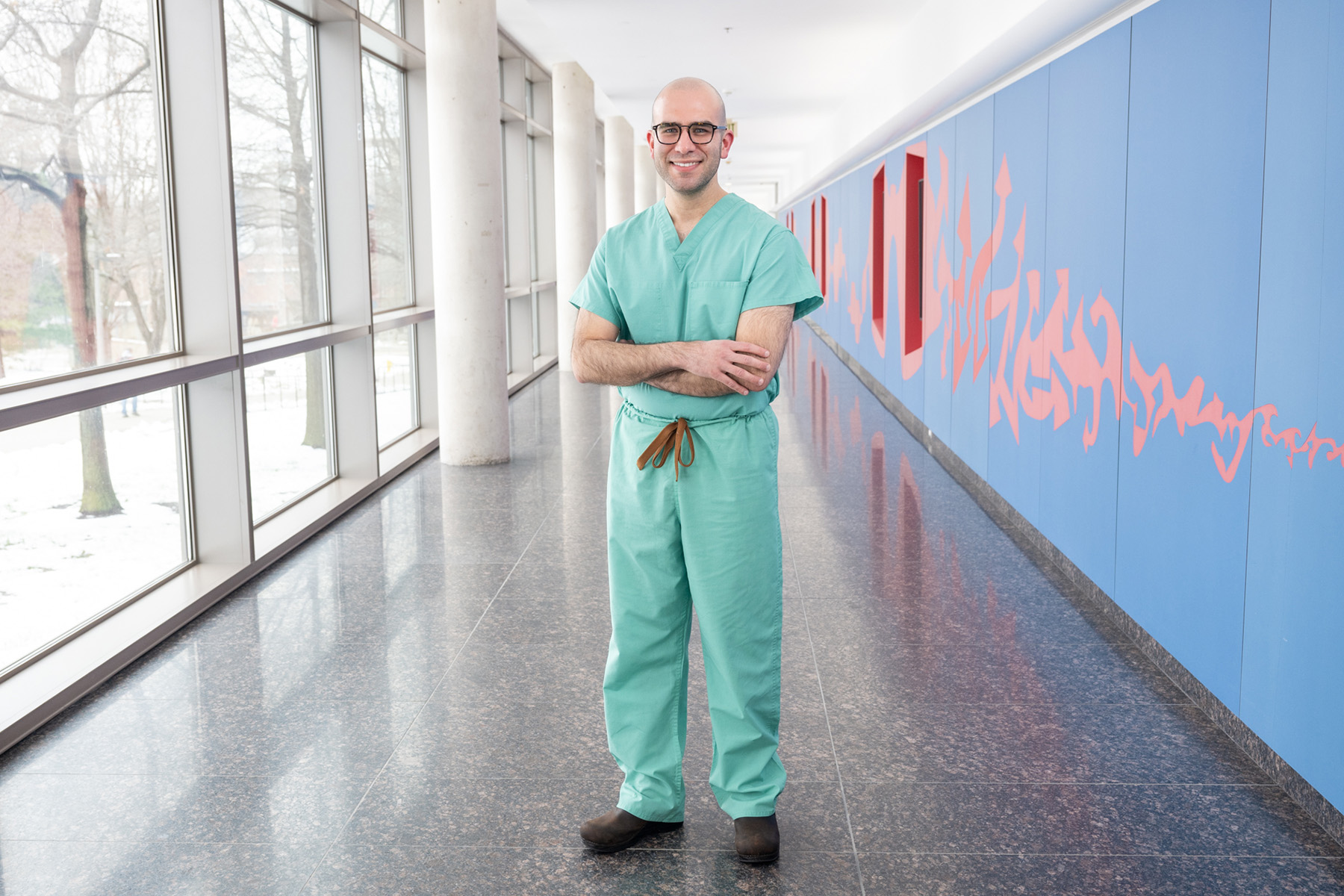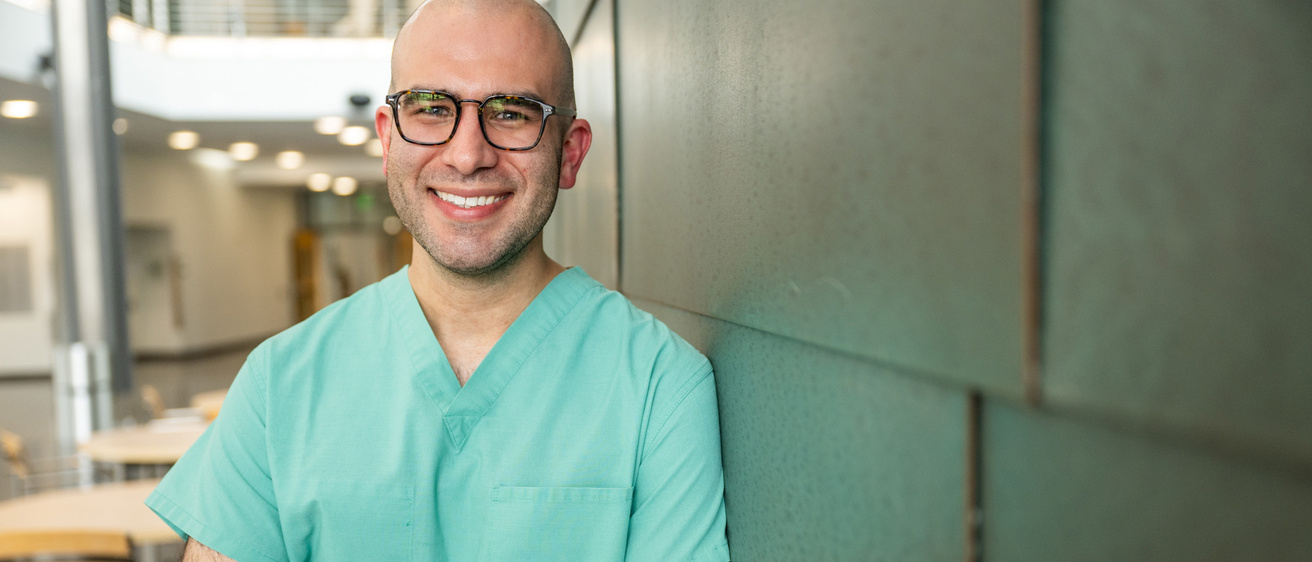Story: Emily Nelson
Photography: Justin Torner
Published: May 1, 2024
Wade Gutierrez loved being in the operating room. He also loved spending time in clinic. He wanted a specialty that allowed both.
The MD-PhD student in the University of Iowa Carver College of Medicine’s Cancer Biology Program and Medical Scientist Training Program ultimately chose urology.
He says his decision was solidified after working on a project with a urologist to educate fraternity members about common men’s health concerns—sexual health, urinary symptoms, fertility, etc.
“As a fraternity alumnus, I was very aware of some of the deficits in young men’s knowledge of their health and their bodies,” Gutierrez says. “And I realized that I enjoyed having those conversations. It was kind of this eye-opening moment where I realized that this was going to be a good fit and something that I could go forward with.”
Gutierrez grew up in Belleville, Kansas, and went to Kansas State University, where he got a BS in psychology, with minors in biology and entomology. He says he knew he wanted to go to medical school, but he also wanted to stay involved in research.
Wade Gutierrez
Hometown: Belleville, Kansas
Degree: MD and PhD in cancer biology
What’s next: Starting a urology residency at Mayo Clinic in Rochester, Minnesota.
“What really sold me on doing an MD and PhD was being in a lab that used patient samples and then actually having patient interaction and seeing the impact that research could have on their health.”
After graduation, Gutierrez will move to Rochester, Minnesota, to begin a residency in urology at the Mayo Clinic.
Why did you decide to attend the University of Iowa?
When I was looking at med school, I wanted to stay in the Midwest, so I applied to different Midwest programs. Iowa was my first interview. The night that I got here, we had an interview dinner and I got to talk to the program directors, the other applicants, and some of the faculty who are part of the program. I was completely sold. I remember calling my mom and telling her this is where I want to go. I hadn’t even seen the campus at that point. I hadn’t seen the hospital. But the people were that important. I knew if I was going to be at a place for eight years, I wanted to have a place that would be supportive.
How has your involvement with the Cancer Biology Program impacted your education and practice of medicine?
The Cancer Biology Program was formed to give a holistic overview of what cancer is, how different types of cancers act, and to dive deep into this singular disease process that has so many different presentations. It gave me an opportunity to learn about the human body and cell biology and what happens when it goes awry, because that’s cancer in a nutshell.
The most immediate connection to my future urology practice is that of course there’s cancer in the urologic organs—bladder cancer, kidney cancer. But beyond that, the skills and the understanding of normal function and abnormal function, how to formulate a hypothesis, and how to plan experiments, those are translatable even if it’s not cancer. I’ve been able to study benign urologic conditions using the skill set that I gained from cancer biology.

Are there experiences that you had at Iowa that you don’t think you would have gotten at another school?
Most definitely. The main research project that I focused on was partnered with a phase 1 clinical trial. As I was in the lab studying the way that this chemotherapy regimen worked, it was simultaneously being tested in the clinic. I was able to speak with the person who was running that trial and to use patient samples from that trial. The fact that the lab is connected to the medical school, which is connected directly to the hospital, really allowed that to be possible in a way that other institutions wouldn’t have been able to facilitate.
Have you found a mentor at Iowa who has had a particularly big impact on your education?
My PhD research mentor, Rebecca Dodd, taught me how to be a scientist. That’s a process that is messy and long. She mentored me from someone who knew the basics of how a lab runs and how to do experiments into someone who can critically think about an experiment or a paper and understand what it means and how to build off it. That’s a great gift that she gave me.
What has contributed most to a sense of belonging during your time at Iowa?
One thing is the community that rapidly develops in any student group at any stage of training. I found community during preclinical years, I found it during the PhD, and I found it after having returned to clinic. Each time, there’s been a group of students that have made me feel like I belong, even if I’m a different age or have different interests. Each time I’ve found a place for me.
What are you going to miss most about the University of Iowa and Iowa City?
The people and the relationships that have been formed over eight years of being here. I know if I have a question or a problem that I can email faculty or show up at their office, and that I will get an insightful answer every single time. And as for the other students who have gone through this process, there’s a certain bond that happens when you’re with someone, not just for that amount of time, but also through the ups and downs of earning two different doctoral degrees.
